Chapter 1: Teaching Opportunities in Hong Kong and Where to Find Them

Not sure where to start your teaching job-search process in Hong Kong?
With all of the different options and resources, sometimes it can be hard to know where to begin. But it won’t take too long figure that out, especially if you have the right guide in place.
In this chapter, we explore where you can find English teaching job opportunities in Hong Kong and the channels through which you can apply for them.
1.English Teaching Opportunities in Hong Kong
Hands down, teaching qualifications is the biggest factor contributing to the jobs you can apply for, and the salary you can expect to receive. Here, we explore teaching opportunities based on the very different qualifications in the industry.
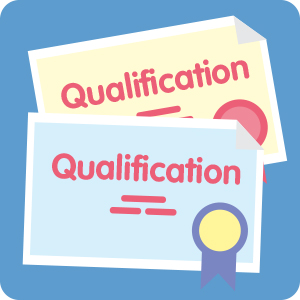
1.1 Teaching Qualification: None
Opportunities: Local education centres, local kindergarten pre-nursery, international kindergarten pre-nursery
Hiring Period: Throughout the year
Where to Apply: Hong Kong Job Websites (listed below in a later section), Kindergarten websites, Education Centre websites
Useful Links: British Council, English Learning Centres in Hong Kong, Education & Training Job Listings
Without a teaching specific qualification, your teaching options in Hong Kong are going to be limited, as will the salary levels you can hope to receive. All is not lost, however, as Hong Kong is abound with learning centres.
English learning centres will typically explore candidates without teaching qualifications, although you will need to be a native-level English speaker to get this opportunity. Moreover, the position will come with lower salary, and involve extensive travelling between locations. Positions may also be available within kindergarten pre-nurseries, but these are becoming less prevalent. And in some cases staying in the position for longer than 1 year will require you to enrol in an Early Child Education degree or diploma course.
1.2 Teaching Qualification: TEFL/TESL
Opportunities: Local education centres, pre-nursery in local kindergarten, pre-nursery in international kindergarten
Hiring Period: Throughout the year
Where to Apply: Education & Training Job Listings, Kindergarten websites, Education centre websites
Useful Links: TEFL Hong Kong
Acquiring a TEFL or TESL (Teaching English as a Foreign / Second Language) qualification allows candidates to demand a higher salary. More importantly, many teaching positions require these qualifications as a minimum for an applicant to be considered. Possessing this qualification can greatly broaden your scope of opportunities.
1.3 Teaching Qualification: Early Childhood Education
Opportunities: International Kindergarten, Local Kindergarten, and Education Centres
Hiring Period: Typically Around May and June
Where to Apply: Early Childhood Teaching Job Listings
Useful Links: Education Post's Extensive List of Hong Kong Kindergartens
Without a doubt, a formal and internationally recognized teaching qualification will have you in the greatest stead when searching and applying for a teaching position in Hong Kong. A degree in Early Child Education, for example, opens another door of opportunities to teach English across all of Hong Kong’s kindergartens and learning centres, be it local or international.
1.4 Teaching Qualification: Primary Education
Opportunities: Local Primary School, International Primary School, International Kindergarten, Local Kindergarten, and Education Centres
Hiring Period: Typically Around May and June
Where to Apply: Government Program, International Schools directly, Primary School Job Listings
Useful Links: Hong Kong Government Primary NETs Scheme
Teachers looking to work in Hong Kong’s primary schools, whether at a local government school or an international school, will need to hold a primary-specific teaching qualification, in addition to a full bachelor degree in teaching. However, preference is also shown for individuals with a bachelor degree in English Language.
1.5 Teaching Qualification: Secondary Education
Opportunities: Local Secondary School, International Secondary School, Local Primary School, International Primary School, International Kindergarten, Local Kindergarten, Education Centre
Hiring Period: Typically Around May and June
Where to Apply: Government Program, International Schools directly, Secondary School Job Listings
Useful Links: Hong Kong Government Secondary NETs Scheme
Whilst an English teaching position in one of Hong Kong’s secondary schools is the highest paying teaching position available, it is also one of the hardest to qualify for. Typically, these schools require candidates with a bachelor degree in English Language, English Literature, English Studies, Linguistics, or Modern Languages, supplemented by a post-graduate diploma in Education (PGDE or PGCE) majoring in English, preferably as a second or foreign language. In addition, some schools will also require a year of English teaching experience at a secondary school level or equivalent for the candidate to be short listed for the role.
2.Where to find English teaching jobs in Hong Kong?
2.1 Schools & Learning Centres Themselves
Typically the recruitment of English teachers in schools falls in line with the traditional academic year. So keep an eye on the schools’ websites themselves, and be on the lookout for new job postings between February and June as schools set their budgets for the forthcoming year.
2.2 Expat and Job Sites
Another great tool to utilize for your teaching job search are Hong Kong’s numerous expat and job sites. Expat sites like Geoexpat have regular threads on English teaching, where to find a job and other job search and teaching tips and advice. Otherwise you can also utilize job sites such as the following:
- CP Jobs
- Jobs DB
- Recruit
- Indeed
- Careerjet
2.3 English Teaching Communities
Several English teaching communities exist in Hong Kong to help aspiring teachers find new opportunities. One of them is the English Schools Foundation, better known as ESF. Sites like ESF provide lists of English teaching opportunities for various levels.
2.4 Teaching Agencies
Alternatively, you can look to join a local teaching agency, although this does limit your ability to source a job in a location and teaching environment that suits your needs. Teaching agencies will source the schools which need a teacher like you, acting as an intermediary in the process.
Now that you have all the avenues to search for the jobs, it’s time to look at the critical aspect of getting a job in Hong Kong, the job application.
Chapter 2: How to Apply for a Teaching Position in Hong Kong
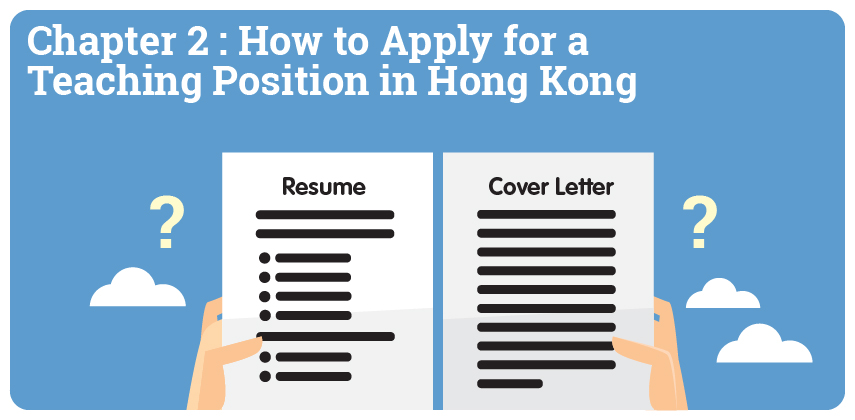
The entire application process will largely depend upon the type of school or institution you are applying for, including the age group you will be teaching, and whether it is a government or private school. However, the Hong Kong teaching application process is typically as follows:
- Job application screening
- Employment tests (if required)
- Interview process
- Job offers
- New hire paperwork
- Start your new job!
But getting to the end of the process comes down to making the right first impression, and the way to make this happen is via your job application. So let’s get right down to it.
We break down the English teaching job application into several sections covering the resume, the cover letter, and how to make them stand out to get you one step closer to your dream teaching job in Hong Kong.
1. CV or Resume?
When applying for a teaching job in Hong Kong, should you use CV or a Resume? Whilst there is never a “one size fits all” approach guaranteed to deliver career success – you can certainly increase your chances of success with the right approach.
1.1 What is a CV?
CV, or Curriculum Vitae, is a document submitted to prospective employers, detailing your professional and academic experience, in addition to job-specific skills and qualifications.
1.2 What is a Resume?
A resume is a snapshot of your professional and academic experience. Summarizing your skills, abilities, and accomplishments typically within a single page or two pages.
1.3 What is the difference between a CV and a Resume?
Where a resume is a snapshot of only the most relevant professional experience, skills, abilities and accomplishments, a CV is more expansive, detailed and is a static document which is not typically tailored to specific jobs. This is the role of the covering letter.
1.4 When should a CV be used for a teaching Job?
Typically, but not always, a CV is only required for individuals with extensive industry experience to detail. As such, we would not recommend providing a CV (unless requested) if you are a fresh graduate, or have less than 5 years’ experience.
1.5 When should a Resume be used for a teaching Job?
Resumes are usually the right option for teachers with less than 5 years’ worth of industry-specific working experience.
1.6 So, should I use a Teaching Resume, or a CV?
9 times out of 10, you are better off submitting a resume. Hong Kong is a fast paced environment, so employers will appreciate brevity and clarity over long-winded and CVs. If you do have any additional information or working documents that won’t fit within the resume, include these in an appendices section.
2. Building an impressive resume section-by-section
The right things in a resume can be the factor that differentiates resumes that get tossed aside or those that prompt the hiring manager to call you in for an interview. So, it’s critical to include only the most relevant and impressive information, as outlined below.
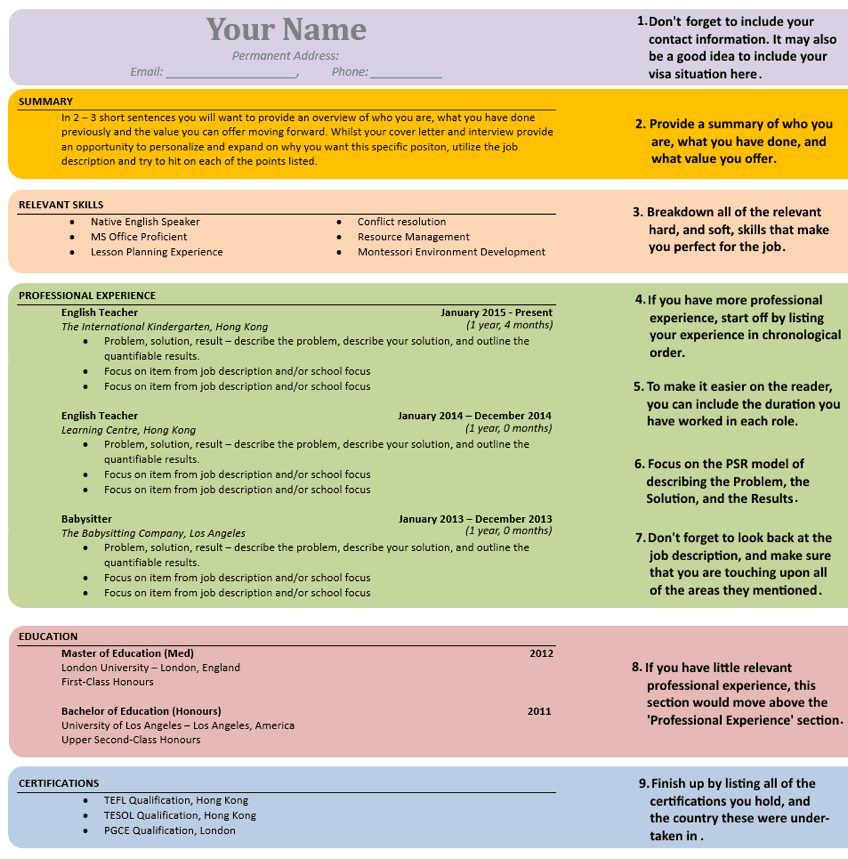
2.1 Contact Information
Make sure to include all, and the most up-to-date, contact information. This includes permanent address, phone number, email, and possibly a LinkedIn or personal website address if relevant. If you possess a valid visa to work in Hong Kong, state that in this section as well. It is one little fact that can easily put you one step ahead of the competition.
2.2 Summary Section
Summarize your resume in 2 to 3 short sentences. Ensure that you are touching upon each of the items listed in the job description, as these are the points they will be looking to match up as they select candidates for interview.
2.3 Relevant skills
List all of the skills you think a teacher should have. You can go as concrete or as high level as you want with this. But commit it to paper. Look at the job description again and add any new requirements that jump out at you. Now think about the skills you have, and the experiences, anecdotes, or qualifications that directly or indirectly relate to these skills.
2.4 Professional Experience
As a teacher you’re going to be judged on your output. Some of these items may not be quantifiable. But one thing that can be is – student grades and achievements! So focus on how your past teaching experience helped to improve your students’ English in various ways.
Think also of the extra classes and after school homework clubs you helped organize. Was there a particular school play, spelling content or new language program you had initiated or executed? List examples not only of how you took the lead, but how it achieved tangible results.
2.5 Education Background
One of the stipulations for obtaining a working visa in Hong Kong is that you hold a degree, with preference given to professionally relevant subjects. As such employers will be looking at the Education section with an eye on how easy it would be for you to meet the requirements.
2.6 Certifications
Perhaps it goes without saying, but it serves as a necessary reminder. Before you dive into teaching in Hong Kong, it is worthwhile to first set out and obtain the relevant teaching qualifications. In addition to becoming a better teacher, and honing your craft, better qualifications also crosses over into higher pay.
3. Taking your resume from impressive to outstanding

This is where it gets interesting. Hong Kong’s education sector is overflowing with candidates, and the limited amount of schools, learning centres and institutions means that competition is fierce. Setting yourself apart from the competition is no longer optional. Let’s delve into the stuff that will take your resume to the next level and get you the interview.
3.1 Prove how well you are aligned to the school
Every teaching job is the same, right? Wrong. Each school and each role will have different requirements and expectations of candidates. Sometimes this will be quite clear – a Montessori school will look for Montessori trained teachers. Take the time to conduct prior research into your chosen school’s standards to gather this vital information. Then, demonstrate how the school’s requirements align well with your skills and background to prove that you are the right person for the job.
3.2 Showcase past initiatives
Teaching is not a 9 – 5 job. Teachers are always spending time at home preparing lessons, marking or completing paperwork. Aside from this, there is always the need to come up with fresh and innovative ideas to engage students. So, impress your prospective employers by showcasing how you have previously gone beyond the scope of your job responsibilities to deliver fantastic results. Whether you previously started an after-school club or educational trips, prove how you are willing to go above and beyond for your students and the school.
3.3 Provide references
This may seem quite self-explanatory, but a reference letter is a critical influencer in any hiring manager’s decision. It may also be a factor that determines whether you get the interview. If for instance a hiring manager notices something that concerns them in your resume, your reference letter may be the one to help them see you in a clearer light. After all, it is always handy to have good references from past employers, or even past students.
3.3 Go further
This is the undefined. We cannot tell you what is exactly required for this, as it will vary with each school and role, and will depend on how you can think out of the box. Essentially, it is about providing something extraordinary, whether it is a video of you teaching a class, an initiative involving new teaching methods, or an activity around a cause that is held strongly by the school or learning centre. The key is to taking the next step to get ahead of your competitors.
So with you resume all sorted, it’s time to go about applying for jobs…
4. Things to consider when evaluating job opportunities
When looking through the many jobs on offer, here are some of the things you may want to consider. Bear in mind that the list of considerations below are a guide, and that you will need to refer to your own requirements and preferences in order to determine if a job opportunity is worth applying for.
4.1 Does it mention a specific teaching style or focus (e.g. Montessori, Reggio)?
A specific teaching style may suit those who prefer a structured educational environment, but may not be ideal for the more creative teachers.
4.2 How well known is the institution or learning centre?
Aim for institutions that have been established as good schools, to ensure that your experience there will be an asset to your teaching career.
4.3 How does the institution’s application process work?
An inconsistent or complicated application process is an indicator of the school’s processes, which will affect the ease with which you get work done or new ideas implemented.
4.4 Where is the school located? Is it located close to public transport?
Key logistics to think about before you apply for the job, to focus on opportunities that are also practical.
4.5 Does it list an immediate start date? Is this feasible given your visa situation?
One of the more important considerations to ensure you have the proper working permits in Hong Kong.
5. Writing the perfect cover letter
5.1 Should I write a cover letter?
Absolutely. A resume can only be personalized so much. The cover letter lets you tell the hiring manager how much you want the job and why you’d be the right fit for the school or learning centre.
5.2 When should I write my cover letter?
We cannot stress this point enough. You should only write a cover letter when you have a job that you are applying for so that you can highlight your key achievements and skills that align with the role and school’s requirements. A generic cover letter does not work. In fact, it only showcases your laziness, so avoid it at all costs.
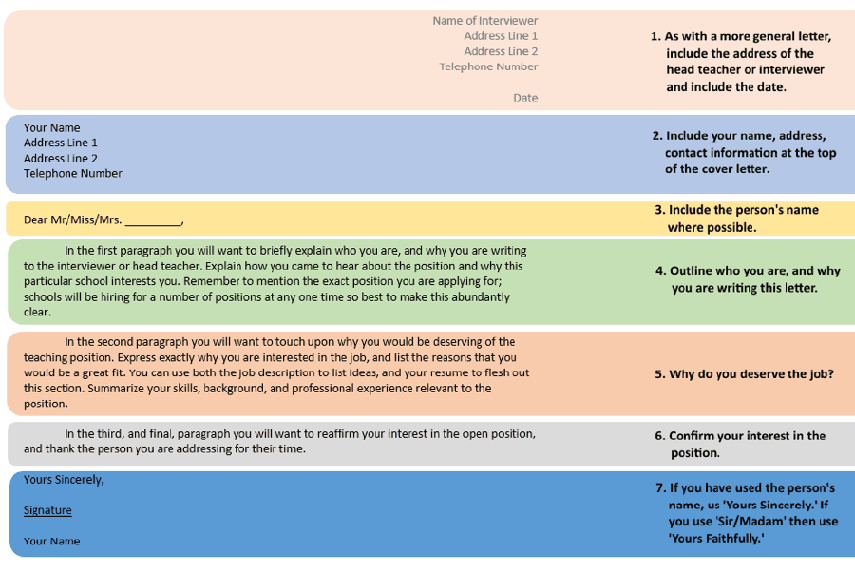
Chapter 3: Handling the Job Interview

Getting the interview is one thing, nailing the interview is a whole other story. Being the first time you will be face-to-face with your prospective employer, the interview can be nerve-wracking. However, think of it simply as a conversation and you will go into the interview with a calm demeanour.
Let’s have a look at the different areas you will need to get right before, during, and after your interview to give yourself the best chance of landing the job.
1. What type of interview should you expect?
Although not always the case when entering a teaching position in Hong Kong, certainly not within learning centres and kindergartens, employment tests are becoming increasingly common, as are group based exercises, written tests across core competencies and subject-specific activities. However, the most common types of interviews are one-to-one or panel based interviews.
1.1 One-to-one, or panel, interviews
The most frequently occurring of interviews is the one-to-one interview. For a teaching interview, the interviewer is typically the head teacher or head of department. Less common is the panel interview where more than one interviewer is present. These predominantly occur towards the later stage of the interview process, most likely during the third interview.
1.2 Group exercises
Group interviews and exercises are not uncommon in Hong Kong’s schools. This type of interview is used as a means to determine quickly the few teachers that encompass a particular school’s ethos in dealing with children, parents, and other faculty members, and therefore can move on to the next round.
1.3 Written tests
As an English teacher, your ability to read, write, and teach English to a fluent or native level will be assessed. As such written tests and exercises may be utilised to assess your writing style and the general level of your English writing skills.
1.4 Subject-specific tasks
These tasks can include specific teaching scenarios. For example, an interviewer may ask you to demonstrate how you would help a struggling child to understand how to construct their writing into paragraphs. These tasks help the head teacher, or hiring manager, to get a better understanding of how you process day-to-day teaching situations.
2. Preparing for a teaching interview
Whilst you may be able to get by using general job interview advice, the best way to ace an interview is to prepare specific teaching examples and situations which showcase both your ability to teach, and your ability to blend in with the school or learning centre’s culture.
2.1 Prepare examples
Always, always, always prepare examples of previous teaching experience which shows how you dealt with difficult students, situations, triumphs, failures, stress, pressure, etc. They want to know not just what you’ve written on your CV, or the qualifications you have, but also practical examples.
2.2 Prepare your answer to the question: “Why do you want to work here?”
Stay away from the generic answers involving how your skills match the role’s requirements. Think about why this role and specifically, why this school or learning centre. More specifically, what is it about them that prompted you to apply for a role there? Is it the culture, teaching style or method fit? A clear, honest and well thought out answer will make you the front-runner.
2.3 Read the job description again
The job description essentially a checklist of everything they are looking for in a candidate, both for the specific job being advertised, and for the company culture fit overall. So use this checklist and wow them by addressing each of the items they are looking for. The goal is for them to tick off every item in the job description in order to decide whether to invite you back for a second interview, so make it easy for them to do so.
2.4 Read your resume and cover letter again
Never ever forget to do this! Make sure that you remember exactly what you said, the numbers you quoted, the achievements you outlined and references you listed. Remember these to avoid long pauses as you think of the answer. If you’ve listed facts and figures on your resume, these should be supported in the interview, otherwise you may very well lose the chance of progressing to the next round.
2.5 Dress to impress
Keep it professional enough to show you are serious about the job, but also casual enough to showcase that you are not too rigid to adapt to different environments. To give you a scale, a suit and tie may be on the extreme end, while jeans and a hooded jacket may be too casual. Try to strike a balance and go with a smart casual attire.
2.6 Read up on current educational trends and news
Never go into an interview telling the interviewer that teaching is your life, only to falter when questioned on the latest developments in the industry. Even a hint of uncertainty or confusion around some teaching methodologies can wipe your chances of getting the job. So, if teaching is really the path you want to pursue, be familiar with what’s happening in the industry and ensure that it is relevant to the school or learning centre you are talking to.
2.7 Get familiar with Hong Kong’s teaching regulations and educational frameworks
Hong Kong’s teaching methodologies can be very different from the teaching frameworks you are used to. So make sure to research Hong Kong’s educational system to ensure you can add some relevant ideas or examples during the interview.
2.8 What questions should you ask in a teaching interview?
If you are unclear on any aspects of the role or the institution, this is a good chance to ask them. For instance, if you are new to teaching, ask if there is a mentor teacher program. However, we would strongly recommend asking about the teaching methodology of the school as this shows both an interest in the position and the school in particular. This will give you a chance to determine whether the school or learning centre is suited to you. Remember, the purpose of the interview is as much them determining how well you would fit their needs, as it is you determining how the role at the school aligns with your goals.
Some potential questions you can also consider asking are:
- How active are parents at this school or learning centre?
- What kind of technological resources does the school have available?
- Do teachers work in teams? If so, how is this organised?
- What professional development opportunities will be available here?
- What is the student to teacher ratio?
- Will the school or centre be addressing any major issues this year?
- When will you make a decision on the role or when will I hear back from you to find out about the next step in the hiring process?
2.9 Prepare the right answers

We highlight the 5 critical questions that you should most definitely prepare outstanding answers for, in order to come out of your interview smiling.
- Why do you want to teach?
Do you want to teach because it is your passion? You want to help people achieve a level of teaching that was not provided for you? Was there a particular teacher or situation that prompted you to become a teacher? If you have been teaching for years, tell the interviewer why you want to stay in this path.
- What experience do you have?
If you have a lot of relevant experience then you can answer this simply by highlighting your experience. However, things become a little more difficult if you have no prior teaching experience. In this case it is important to frame other experiences you do have such as volunteering to coach children or tutoring and explain how these experiences have made you realise your passion for teaching and how they are relevant to the role’s and school or learning centre’s requirements.
- How is your academic background relevant?
Teaching English requires a certain level of English fluency for one. But that doesn’t necessarily mean only English majors can enter in to teaching in Hong Kong. The opposite may very well be true. Whereby all courses delivered in English guarantee an ability to converse fluently in English, candidates with an academic history in another subject area may be able to bring ideas to improve teaching methodologies. A degree in Psychology, for example, makes a candidate better suited for a role in early childhood education than a candidate from an English Literature background.
- How do you handle pressure?
Teaching is a stressful occupation, one that most definitely comes with pressure, whether from the faculty, school board, students’ parents or even the students themselves. Adding to these is the pressure of being in Hong Kong’s fast paced environment. Before an interview, you need to come armed with examples on how you cope and overcome pressure. It would also be helpful to add some personality traits of yours that correspond to your method of handling pressure. For instance, if you are generally patient, calm and collected, you may add that pressure does not cause you to stress or disrupt your productivity.
- How would you deal with a disruptive student?
Disruptive students can be found in each and every institution, regardless of culture, nationality or age group. So prepare an example of how you had to deal with a disruptive student in the past or how you would overcome the situation should you be faced with it in the future. Would you focus on discipline? Or would you rather try to find something that better engaged the child, and direct their energy to more positive behaviour? If you have no prior teaching experience, try to think back to a time when you had to manage a disruption, in your personal life or your previous career, to show the interviewer that you will be able to manage such situations in the future.
Whilst we’ve highlighted the top teaching interview questions and given you tips on how to answer them, below are additional questions we believe you should also prepare for:
- Tell me about yourself
- Describe your teaching philosophy
- How do you communicate with your students’ parents?
- Have you used, or how will you use, technology in the classroom?
- If I walked into your classroom during a lesson, what would I see and hear?
- What are the key qualities and skills that students look for in a teacher?
- Why do you want to work in this school / learning centre?
- How would you describe a successful principal?
- Picture yourself 5 years from now – what are you doing?
- What are your interests outside of the classroom?
- What personal strengths do you find especially helpful in your teaching?
- What are your weaknesses?
- What is the greatest challenge you have overcome?
- If you overheard some colleagues talking about you, what would they say?
- Describe how you would handle a furious parent complaining about his / her child’s grades
- Can you tell me about a conflict that you’ve been involved in?
- If you noticed a student being bullied, how would you deal with the situation?
- Can you tell me about a successful behaviour management strategy you have used in the past that helped engage your students?
- Tell me about your discipline philosophy
- If we decided not to offer you the role, what would our school and students be missing out on?
Even with the additional 20 questions listed above, there is no such thing as over-preparing for an interview. Here are some resources around teaching interview questions to help you prepare for all the questions you could be asked.
3. Do’s & Don’ts for your teaching interview

3.1 Do:
- Demonstrate clear communication
- Logical reasoning
- How you interact with others
- Let your personality & attitude shine
- Use real examples
The interview stage, albeit a little daunting, is your best opportunity to sell yourself as a teacher, professional, and future colleague. All great schools are built on hard work and good communication, so make sure you are showcasing how you can bring both to the table.
Teaching is no doubt one of the most difficult jobs. It requires an acute ability to deal with a myriad of situations (read: problems) in creative ways. So the interview stage is the perfect time to showcase your ability to think rationally and with solid reason.
In a teacher, a school or learning centre also wants someone who can manage students with a positive attitude and get along well with the faculty staff. Essentially, they are looking for personalities who can be a role model for their students. Cite your past experiences and share any moments which showcase your relationship with your past students and colleagues to remove any doubts in their mind.
No one wants to work, or be taught by, a robot – so ensure you do not come across too rehearsed for each and every question to the point where you fail to show how interesting and passionate you are.
What sets apart great teachers from the good ones is the use of real world examples to demonstrate their teaching style and skills.
3.2 Don't:
- Under prepare
- Criticise another school or learning centre
- Downplay your achievements
- Do all the talking
- Forget the examples
Remember that terrible exam you had? The one where you walked out knowing you had failed? Job interviews are far less forgiving then exam markers are, so there is no such thing as over-preparing for it. Prepare your answers ahead of time, get a friend or family member to interview you for practice and don’t forget to perfect your pitch. All of this will get you one step closer to landing that job.
If you ever find yourself complaining about another school or past employers, chances are you won’t get the job. No one likes a complainer. When you’re asked a question about why you left your previous job, be sure to never badmouth your past colleagues or employer, and instead opt for a diplomatic answer around a difference of opinion.
No one likes someone with a huge ego, but at the interview stage you are in direct competition with a number of other applicants, so it is excused, and even welcomed. A difficult line to tow, but that is why extroverts tend to perform better at interviews! Even if you’re an introvert, don’t be shy to demonstrate how your skills and achievements can address the requirements of the role and therefore, make you the right person for the job.
Try not to overpower the interviewer in your excitement and nervousness. It can be tempting to just get everything out, show them you’ve prepared well and answer each and every question ‘perfectly’. But interviews are meant to be a dialogue, so make sure to allow the interviewer to lead, and take the lead when you’re invited to ask questions.
Thinking you can wing it and come up with examples on the spot is never a good strategy. No one wants an interviewee who spends time trying to think of an example, only to stumble and miss all the relevant details while telling the tale. Preparing clear and concise examples ahead of time is a must.
To learn more about the dos and don’ts in a teaching interview, refer to our article.
4. Interview Follow-up
Please remember to thank your interviewer within 24 hours of the interview. It shows not only that you are genuinely interested in the position, but also that you respect the interviewer’s time. In addition, it affords you another opportunity to reiterate why you are the right person for the job, and to further explain any areas that you feel were not adequately covered during the interview.
See below for a sample teaching interview follow-up.
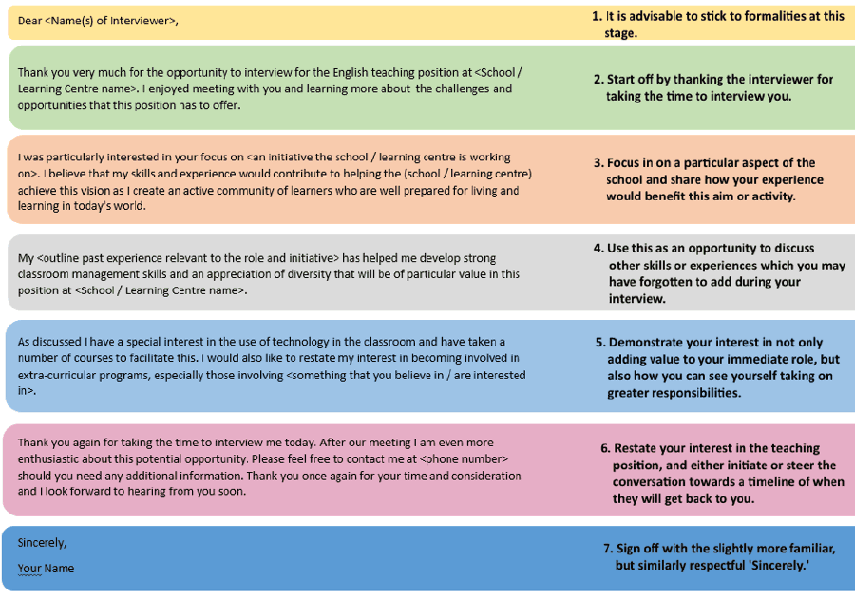
Chapter 4: Negotiating the Contract

Think you can’t negotiate a teacher’s contract? Think again.
Whilst government and local institutions’ teaching contracts are more rigid, international schools and learning centres have room to move. The key is to be strong and firm when negotiating, whilst being reasonable about your demands.
Here are our 5 tips on negotiating the contract.
1. Take the time to look at the details
Don’t fall into the old trap of signing the first contract that falls into your lap, or accepting the first offer on the table. If they try to rush you into making a decision, it may pay to hold off. Give yourself time to evaluate the contract; including salary, benefits, and terms and conditions to determine if this is the right opportunity for you.
2. Seek advice
Worried that the contract you are signing may not be all that it appears? Did you find any strange clauses? Not sure what it all means? Then it’s probably better to get some advice from your teacher friends, past colleagues or even a professional who can give you clarity. Once the contract is signed, you are contractually obligated to fulfil its terms, so ensure that you understand and agree before signing on the dotted line.
3. Do some calculations to determine if the salary on offer matches average salary levels and your expectations
It’s will do you no good to sign a contract before you consider the financial impacts of it. The key will be to know the average salary for someone of your background and experience. Ask around on teaching forums, find salary reports or reach out to other teachers in your network. Then, take into account your costs, which in Hong Kong includes high rent, transportation and food. Consider whether you will have enough disposable income to save or enjoy living here. Bear in mind that Hong Kong’s income tax rates differ from many Asian or western countries, and with different conditions around the period of time and threshold for tax exemption. You can head to the Hong Kong Inland Revenue website for more information.
4. Be reasonable
While it may benefit you to be firm about your demands during negotiations, it also has a risk of backfiring. The single most important thing to note is that if you really want the job, you may have to compromise on certain aspects of the contract, especially if the contract is able to meet some of your requirements. Ultimately, is important to go into negotiations with a clear idea of what matters most to you, be it flexible working hours, long holidays, or a salary increase. As long as the contract is reasonable and they aren’t insisting on something you vehemently disagree with, it may pay to back down on some demands.
5. Be confident
Negotiating your contract is no easy task, but it’ll be even harder if you’re not confident. Go in to the meeting knowing your worth, and be confident about the value you will be able to bring to the school or learning centre and you will be able to come out of it smiling.

Once you have all the details of the contract ironed out, it’s time to sign!
Chapter 5: The Hong Kong Visa Application Process
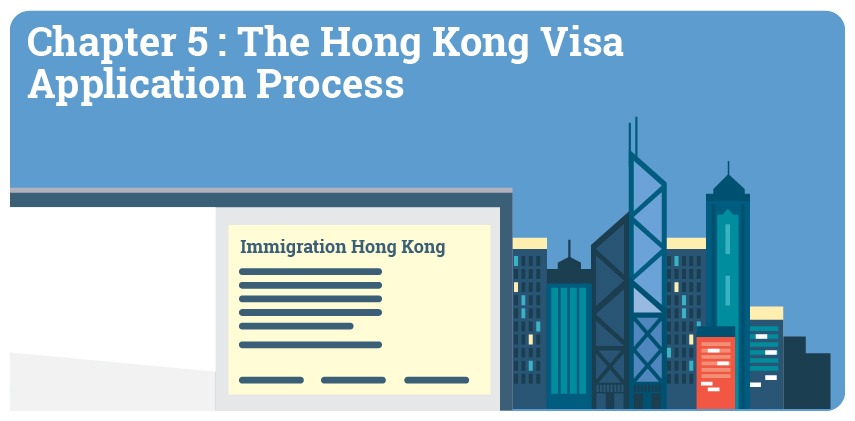
If you are not currently a permanent resident holder, you will need to get a working visa to legally live and work in Hong Kong. We briefly discuss the visa application process below.
1. What do I need to get a working visa in Hong Kong?
1.1 Employer sponsorship
The first and most important point is that to be eligible to get a working visa in Hong Kong you will need to be sponsored by an employer. This means that you will need to have a job secured before applying for a visa.
1.2 Skills that are not readily available in Hong Kong
Each and every foreign worker in Hong Kong must first prove that they are more qualified to do the job than a local candidate. Please bear in mind that this will differ depending upon the teaching qualifications you have.
1.3 Qualifications
Whilst this isn’t always mandatory, it is most certainly a lot more difficult and time consuming to apply for a teaching position in Hong Kong without holding a relevant degree or qualification. Qualifications, in the case of a visa application, indicate that you are serious about pursuing a career in the field and typically help tip the odds in your favour.
2. Who handles the visa application?
The paperwork required to apply for a working visa will be handled by your employer, as they are required to make the case for why they are hiring a foreign, over a local, candidate. However, you may be required to provide documents or clarification at certain stages of the application process. Typically, your employer will be in direct contact with the immigration officer dealing with your application.
3. How long does the visa application process take?
A working visa application in Hong Kong usually takes between 4 and 6 weeks to process. However, this can be longer or shorter depending upon the immigration officer handling your case, whether you have met all the visa requirements, as well as the completion and accuracy of the documentation provided.
4. How long does the visa last for?
Typically work visas in Hong Kong process as follows:
- 1st working visa in Hong Kong (1 year)
- 2nd working visa in Hong Kong (2 years)
- 3rd and all following working visas in Hong Kong (3 years)
5. Can I work outside of the working visa?
You are only legally allowed to take on work which has been approved by the Director of Immigration in Hong Kong, which typically is limited to the work undertaken for said sponsor and the scope of work within your contract that is supplied to immigration for your visa application.
As such, if you do hold a working visa and wish to do additional work (freelance work or private tutoring) outside of the institution you are employed at, we would recommend that you first clarify this with both your employer and the Immigration department.
6. What happens if I leave the company before the end of the contract or visa?
Working visas are not transferable from one company to another. So if you do leave the company that sponsored your visa before the end of the contract, then you will need to put in a new application process with your new employer.
All of the information above was sourced from the Hong Kong Immigration Department. For the latest visa regulations, be sure to reference the official website or discuss your situation with an appointed Hong Kong immigration officer.
So what are you waiting for? Go ahead and get started with your job application to become an English teacher in Hong Kong. Good luck!
Start your search today with our job listings.


